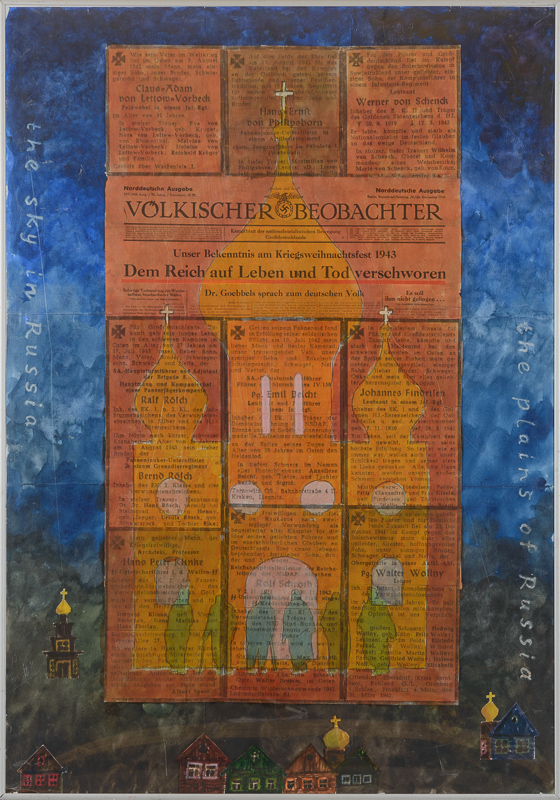.
Dødsannoncer • Obituaries • Todesanzeigen

Akvarel. Avispapir, karton.
Dødsannoncerne i det nazistiske dagblad Völkischer Beobachter illustrerer Hitlers og nazipartiets næsten religiøse indflydelse på dele af den tyske befolkning.
Alle annoncerne, der omhandler faldne tyske soldater fra østfronten, indledes med en hyldest til Hitler: ”den allerkæreste Fører”, taknemmelighed for deltagelse i kampen mod Bolsjevismen samt beskrivelse af den afdødes karriere i naziparti og hær.
Dødsannoncen i midten til venstre er grotesk. Den omhandler to brødre, der er døde i Rusland, 19 og 27 år. Begge med omfattende aktiviteter i Nazipartiet og hæren og begge er tildelt flere ordener. Annoncen er underskrevet af faderen og moderen. Dog er der efter faderens navn nævnt: ”forsvundet ved Stalingrad”. Dvs. moderen har indrykket en annonce, hvor 2 sønner er døde og faderen forsvundet (statistisk set formentlig også død). Hun har underskrevet annoncen ”Med stolt sorg”. Vistnok i 1942 ophørte avisen med at bringe dødsannoncer pga. omfanget og det negative signal de mange annoncer ville sende til læserne og den tyske befolkning.
Watercolor. Newspaper, carton.
The obituaries in the Nazi daily Völkischer Beobachter illustrate the almost religious influence of Hitler and the Nazi Party on parts of the German population.
Almost all the obituaries, which include fallen German soldiers from the Eastern Front, begin with a tribute to Hitler: “the most beloved Commander”, gratitude for participating in the fight against Bolshevism, and a description of the deceased’s career in the Nazi Party and army.
The obituary on the center left is grotesque. It deals with two brothers who died in Russia, aged 19 and 27. Both had extensive activities in the Nazi Party and the army and both were awarded several orders. The father and mother both signed the obituaries. However, after the father’s name was noted: “disappeared in Stalingrad”. The mother had inserted an obituary in the newspaper in which it is noted that her two sons have died and the father has disappeared (statistically speaking probably also dead). She has signed the obituaries “With proud grief”. Apparently, the newspaper stopped printing the many obituaries in 1942 due to the scale and negative signal it was sending to readers and the German people.
Aquarell. Zeitung, Karton.